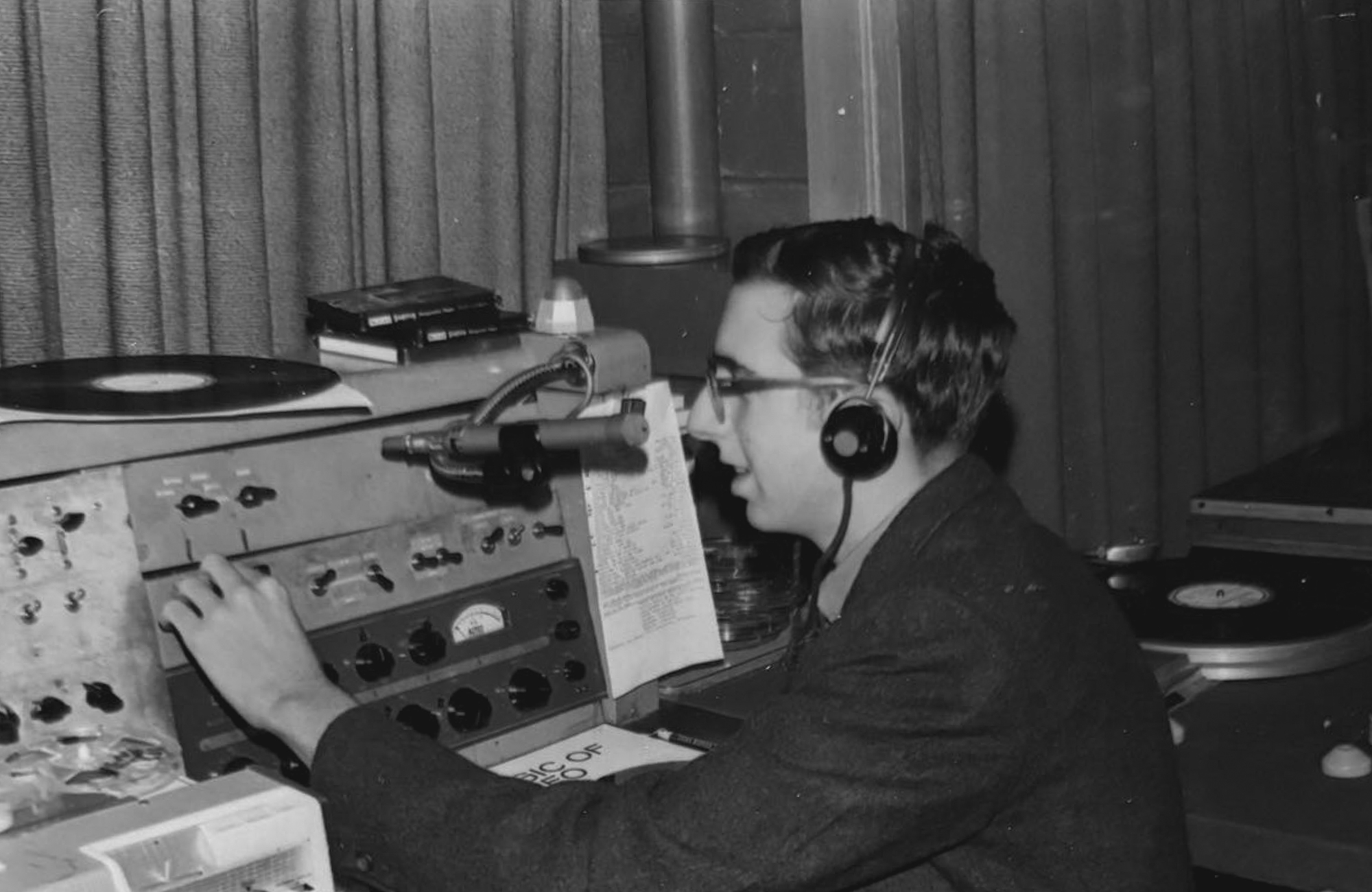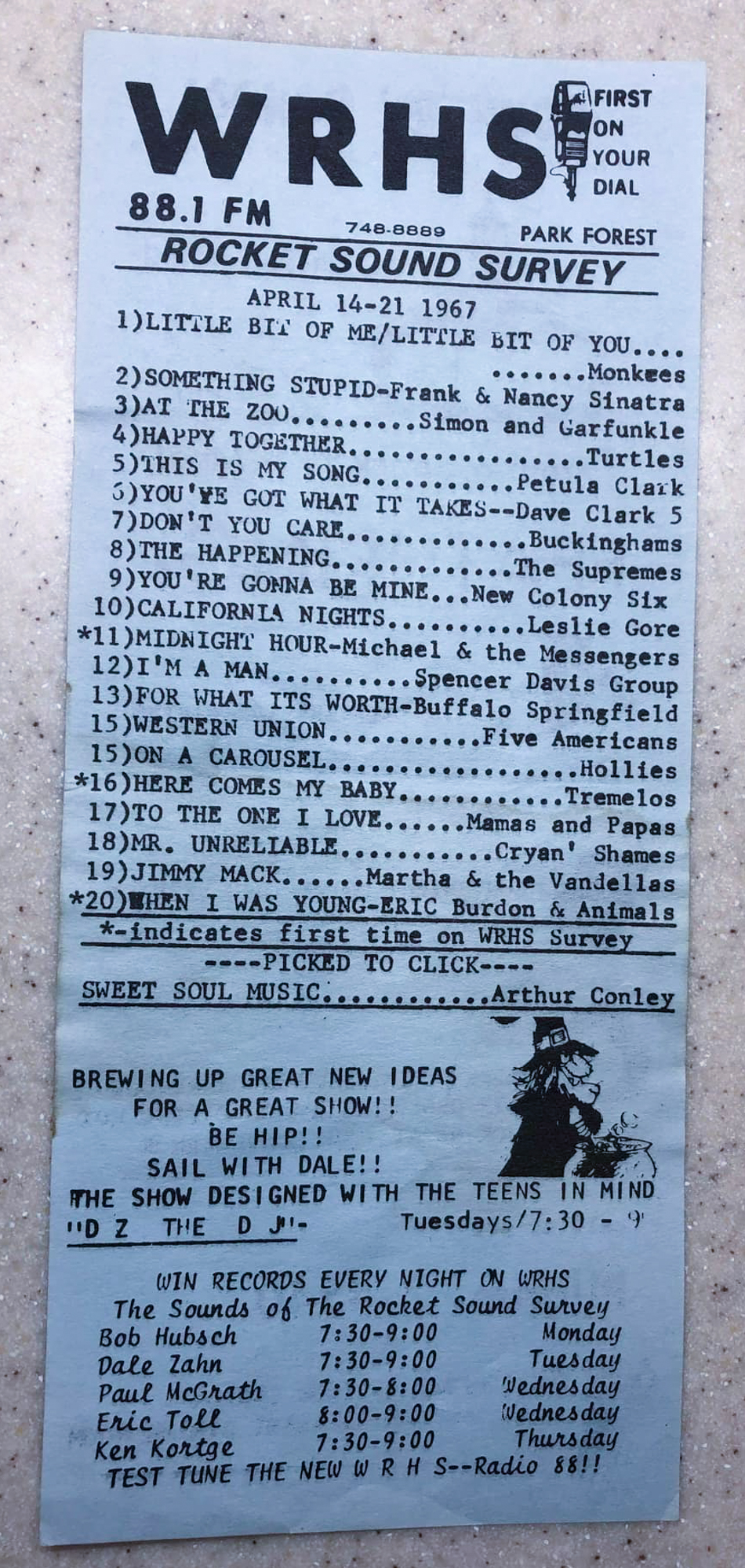
Be Sure to Wear Flowers in Your Hair
Published on Jan 19, 2026
WALK OUT TO WINTER: falling in love with—and to—Aztec Camera's High Land, Hard Rain
Published on Dec 26, 2025
First Anniversary
Published on Dec 17, 2025
Introducing: The IHTOV Zine
Published on Dec 15, 2025
More Liner Notes…
Featured Essay: How a High School Radio Station Became Chicagoland’s First FM Rock Revolution
by Eric J. Toll

“We were jocks!” reminisced Dale P. Zahn from his ice-stormed Le Claire, Iowa, house. “In high school, if you were on the football field or playing basketball, you were something. That radio station gave us the right to be jocks.”
Tucked in a barely ventilated room in the corner of the drama department’s rehearsal room, in 1966, WRHS, 88.1 FM with its group of high school music rebels became the first Chicagoland FM station to play rock-and-roll music. Wikipedia credits WLS-FM as Chicago’s first commercial FM station to play rock-and-roll in 1968.
“As good as my memory is, no, I can’t remember the first song I played on WRHS,” said retired association CEO Zahn. “I can name the three songs I played as a guest teen disk jockey on WLS.”
Knowing him and the hits of September 1966, “Summer In The City,” by The Lovin’ Spoonful was possibly that premiere play—although “Land of 1,000 Dances” by Wilson Pickett was just as likely a candidate.
Being a guest teen disk jockey was another story. WLS-AM picked high school students from across Chicagoland to do a 15-minute gig as a guest DJ at 9:00 on Saturday night. Zahn was the first from Rich East to make the gig.
Memories come flowing across the decades about those days on the air while I video conferenced with Zahn and fellow WRHS disk jockey, Paul McGrath. They were both under ice storms back east while it was a balmy 74 degrees at my place in Phoenix, Arizona.
In those days WLS was the 50,000-watt Chicago top 40 powerhouse. FM was a quiet refuge of classical music, show tunes, the Great American Songbook and jazz. And then there was the station with the 10-watt tailwind at Rich East High School in Park Forest, Illinois.
Since its inception a few years earlier, the station was on the air from 4:30 to 8:00 p.m. three days a week. Staffed by students with faculty sponsor overseers, the station primarily played public service and educational content, re-read news from high school and local newspapers, and classical music and show tunes.
That all shattered in 1967. With a PA mixer as a control panel and a mono-FM transmitter heating the studio winter and summer, the new student leaders decided to break from the past.
“We were students. We all listened to WLS or WCFL. We went to sock hops,” said Zahn. “We were supposed to be a student club for students. So rock and roll was the way we’re going to be.”

There was some pushback when the first of the 45s started hitting the airwaves. In 1967, some thought playing rock music on FM was illegal.
This was back when disk jockeys were the entertainment, not just a voice-over. We told jokes and took requests from listeners and pals in the hall. Disk jockeys prided their voicework over the record intros.
I remember my first song. I drove Mom and Dad up the wall, playing it over and over again, practicing what I was going to say. I even bought a stopwatch to check my timing. I would use every millisecond of the 12.6-second guitar riff that opened The Rolling Stones’ “Satisfaction.”
Except that my tongue tripped halfway through, and I stomped all over, “I can’t get no…”
We learned, experimented, and picked up skills that helped us later in life.
“I can’t remember the first song I played,” said Paul McGrath, Lansing, Illinois, recently retired from a career managing dental labs. “It was probably a Young Rascals song. I loved the Rascals.”
That song likely was the Rascals’ August 1967 release, “How Can I Be Sure.”
“The music we had was just magical,” said McGrath. “I mean, it was such a variety, and it was actual music.”
And the music played on. The faculty sponsors either resigned to rock’n’roll or wanted to hand us a rope for hanging. As word spread that the station was playing songs high schoolers wanted to hear, we started getting requests in the hall. WRHS had no telephone. Once that was remedied, we started getting calls for requests while on the air.
The Rich East Rockets student council noted the station’s popularity. With faculty permission, they increased funding extending on-air hours from 4:00 to 9:00 four nights a week.
The 45s piled up in the studio. Who could afford albums at $4.98 in those days when the song you wanted was just 69 cents at Goldblatt’s or Sears? We had to buy our own records to put into the station library to handle requests and keep up with the latest hits.
That changed early the following year. A few record companies started giving us “promo records,” free 45s and occasional albums in exchange for the airplay.
“Being on the air was like a chick magnet and popularity boost,” Zahn laughed. “You’d get dates with cool girls and you’d get stopped in the hall with someone saying, ‘I heard you on the radio.’”
When one of the cheerleaders had one of her friends tell me (that’s how it worked in the 60s) that she wanted to go out with me because I was on the air, it was, as we said in those days, a mind-blowing experience. It ended up being an awful date; I was a klutz and we had nothing in common but she had the most beautiful blue eyes.
“Well, I was hoping it would be (chick bait),” McGrath chuckled. “I really don’t think it was for me. I was looking for more popularity and hoped it would help me meet some girls.”
For McGrath, the experience gave him the confidence to take a stab at being a professional musician. Zahn played bass and sax. The two joined together in a group called Honey and the Bees. Toll and Zahn did some live emcee work and played disk jockey at sock hops. McGrath took his guitar to the stage with numerous bands across Chiicagoland, even playing as the warmup group for concert headliners.
In Chicago, there were four high schools with radio stations at that time. Rich East’s rival, Homewood-Flossmoor High School, had one of the best-equipped, but rock and roll was verboten. While we envied their actual broadcast equipment compared to the WRHS PA mixer, they envied that we could play the hits.
A few years after my graduation in 1969, the school district allowed WRHS’ Federal Communications Commission license to expire, and the station went dark. The sounds of the Beatles, Stones and Rascals were no more at Rocket Radio 88.
“It was a shame that happened,” lamented Zahn. “It was a good breeding ground for people at that high school radio station. If we had the power, I’d bring back a high school radio station in every district.”
McGrath said that being on the air gave him the confidence to express himself. Zahn and I both had championship stints with interscholastic speech competitions. Zahn won the 1968 Illinois state championship in radio speaking, and I carried the day at the New Trier Tournament of Champions a year later.
“(WRHS) served a real purpose. It gave the non-jocks, those non-athletes ones, something to feel good about,” Zahn remembered. “When you look back at what we did, we didn’t realize it then, but we do now.”
Eric Jay Toll is a business journalist and travel writer-photographer who once was spinning disks on WRHS from his freshman year in high school several eons ago. In the years since Rich East, he wrote news for CBS Radio/Chicago and worked in broadcast advertising sales and for an ad agency before spending decades as a city planner. The Great Recession gave him the opportunity to become a writer. More than 2,000 articles appear under his byline and four awards hang on the wall. Eric’s work has appeared in USA Today, MSN, Chicago Tribune, Houston Chronicle, National Parks Traveler, She Buys Travel and other publications. He lives in Phoenix, Arizona, and travels a lot. On Facebook, he is https://Facebook.com/EricJayToll and @EricJayToll on Instagram.
I Have That on Vinyl is a reader supported publication. If you enjoy what’s here please consider donating to the site’s writer fund: venmo // paypal. Tips go toward paying writers, an editor and for site maintenance

